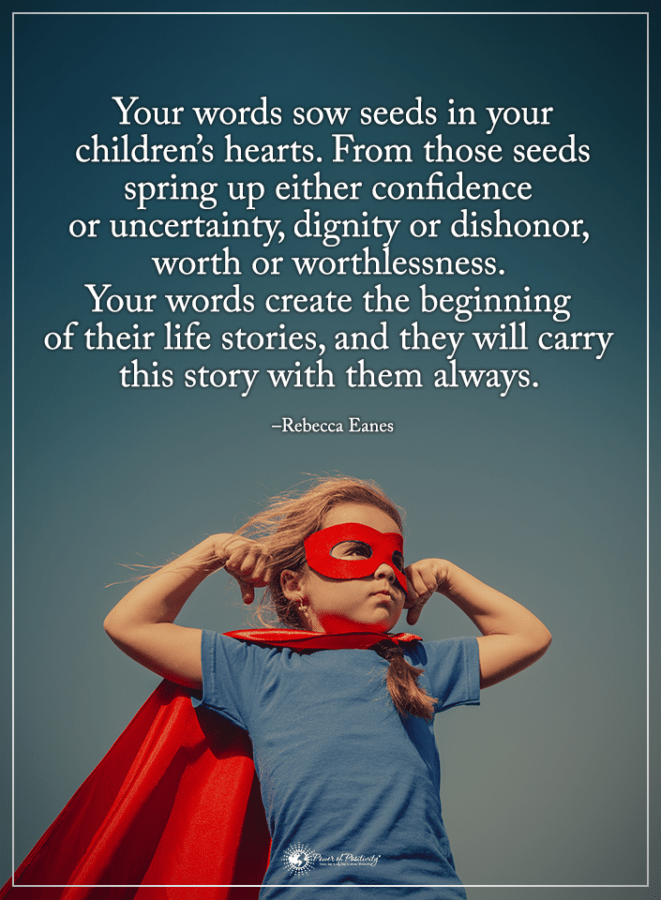(***Acknowledgement…) Being a parent is hard work. If you’re a parent, you know this. It’s hard. Unfortunately, parents sometimes let their emotions get the better of them and dish out discipline that is neither in the parent’s or the child’s best interest.
Be the parent TODAY that you want your kids to remember TOMORROW.
To all current and future parents, please go back and re-read the above quote again. In fact, do yourself a favor and memorize it. The quote isn’t long, so it shouldn’t be too hard. Most importantly, understand that these words are 100 percent true.
What kind of parent is your child going to remember? What kind of influence are you going to leave with them? And what will you teach them? Parents are a huge influence on a child’s personality.
Parents help determine what kind of person that child will become.
Enter discipline.
The word ‘discipline’ stems from the Latin word disciplina ‘instruction, knowledge’ from discipulus ‘learner’, from discere ‘learn.’
While many of us attach a certain degree of harshness to the word ‘discipline,’ the word was born from the ideas of instruction, knowledge, and learning.
This isn’t to say that firmness in the application of discipline isn’t necessary; sometimes it is. In the military, firm discipline can save lives. In the classroom, steady discipline maintains order. And in our daily lives, self-discipline can lead to achievement, financial freedom, and happiness.
Discipline can make us better people.
Discipline can make our children better people.
Child Discipline: 10 Things To Know
“Discipline isn’t just about giving kids consequences. Instead, it ensures children are gaining the skills they need to become responsible adults.”
The above is a quote by Amy Morin, a renowned life coach and discipline expert. In one of her posts, Morin describes four ways in which proper discipline benefits children:
1. Discipline helps kids manage anxiety.
Morin states that kids test the patience level of caregivers to ensure they’re able to keep them safe. When positive and negative consequences are offered, children learn and grow. On the flip side, overly-permissive parents convey a lack of guidance and leadership, which is a source of anxiety for youngsters.
2. Discipline teaches kids to make good choices.
Morin states that temporary suspension of a child’s privileges, or “play time,” provides the child with the incentive to make better choices. Healthy discipline helps children learn impulse control, self-control skills, and problem-solving skills.
3. Discipline teaches kids to manage emotions properly.
Morin uses the discipline of “time-out” to illustrate this next point. “When a child receives a time-out after hitting his brother, he learns skills that will help him manage his anger better in the future.”
Morin also describes the benefits of positive discipline strategies, such as praise: “When you say ‘You are working so hard (even) though it is really hard to do. Keep up the good work,’ your child learns the importance of tolerating frustration.
4. Discipline keeps kids safe.
Teaching children to look before they cross the road – and administering positive discipline if they fail to do so – can ultimately save a child’s life. While children will inevitably get hurt, a necessary foundation of self-control, achieved through discipline, benefits the child in both the short and long-term.
5. Positive discipline is paramount.
Dr. Jane Nelsen, a distinguished educator, psychologist, and mother of seven states “The key to positive discipline is not punishment, (but) mutual respect.” While the specifics of Nelsen’s discipline framework is beyond this article’s scope, positive discipline teaches rather than punishes; encourages rather than praises; focuses on identifying and correcting the behaviors rather than the child.
6. ‘Negative Discipline’ is real – and it’s pointless
Negative discipline is counterproductive and potentially harmful psychologically. Striking, admonishing, or otherwise mismanaging one’s emotions while issuing discipline has been shown – in study after study – to be ineffective and possibly damaging to the child.
7. ‘Logical Discipline’ is real, too – and it’s effective
WebMD explains ‘logical consequences’: “The consequence is directly linked to the behavior. For example, you tell your child that if he doesn’t pick up his toys, then those toys will be removed for a week.”
8. Taking away privileges is another way
Temporarily removing privileges is another effective means of discipline. If the child doesn’t do their homework on time, for example, taking away their television privileges provides an incentive for them to act responsibly. Timeouts are another means of removing privileges.
9. Natural conseqences may prove more effective
When your child does something wrong, and you let them experience the consequences of that behavior, there’s little need for your intervention. For example, if you’ve told them the importance caring for their toys and they break one, they simply don’t have that toy anymore.
Experience is sometimes the best teacher.
10. Setting the right example beats discipline
As mentioned, children learn from what they see and hear. Parents who set a good example often find that they needn’t frequently discipline their child. After all, the child doesn’t do many things wrong.
They’ve been taught the right way.
Does this mean the child is perfectly behaved? Of course not! All children will get into mischief – that’s part of being a kid! But you can bet that your words and actions directly affect the child’s behavior – and the need for discipline.














 Community
Community

